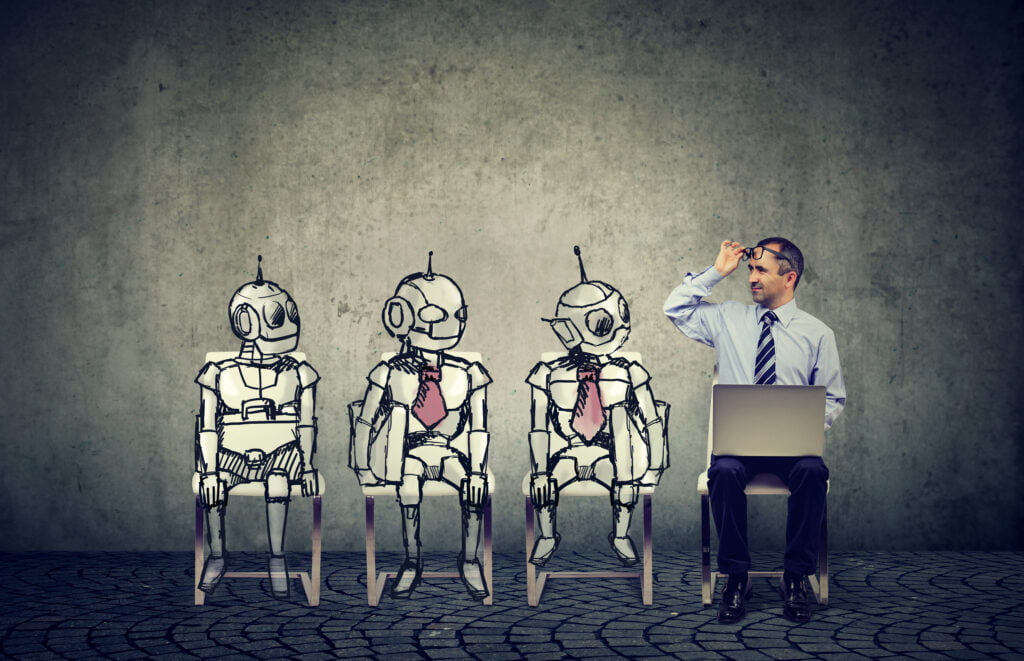Scrolling through my LinkedIn feed lately, I can’t go more than a few seconds without tripping over yet another emotionally charged post highlighting the pros and cons of artificial intelligence. Of course, most of the buzz right now surrounds ChatGPT.
I discussed AI and its impact on the world of voice acting in a previous blog, but this latest surge of hype/panic suggests concern over AI has spiked considerably, and not just in my line of work. It’s now being hotly debated across a wide range of professions.
ChatGPT chatter seems to fall in one of two camps: it’s either a groundbreaking, astoundingly versatile technological marvel or it’s the most loathsome, malevolent bastard of an invention to come down the pike in generations. Some fear it’s so good at learning to perform specific tasks that it actually renders human beings unnecessary. They worry this threatens to disrupt entire industries by putting countless thousands of people out of work. I’ve noted a collective shudder throughout a variety of occupations including software developers, market research and financial analysts, e-learning designers, customer service agents and freelance writers.
Meanwhile in the academic world educators are stunned to learn ChatGPT may actually be smart enough to pass the notoriously super-difficult medical boards and bar exam. And they’re wondering if students might game ChatGPT to cheat: what if it did all their research for them, or wrote a fake term paper?
One of my college fraternity brothers, now the dean of a law school, recently triggered an interesting discussion on Facebook by demonstrating how ChatGPT can apparently generate a fairly convincing – although totally phony – law school application essay with nothing more than a few prompts and keywords. For any applicant lazy and dishonest enough to employ AI this way in a bid to gain admission feels like an offense on a par with plagiarism.
This ultimately gets to what I think is AI’s greatest weakness: it completely lacks authenticity. It’s a crutch to produce something in which you personally invested almost no original thought or effort, and certainly none of your own spirit. No “life energy,” as an old friend used to say.
I suspect that inauthenticity will prove to be AI’s Achilles heel when it’s applied in areas where it really counts, like the creative professions. ChatGPT and similar programs can be configured to perform creative tasks such as graphic design, music, and – here’s the one that’s royally pissing off my fellow travelers in the professional voiceover world – generating synthetic voices.
Should this worry us creative types? Personally, my apprehension only goes so far. That’s because in the creative sphere that fundamental lack of authenticity – I’d actually call it humanity – becomes a liability. It’s a baked-in, self-destructive fatal flaw. When a creative work is stripped of its distinctive and inimitable human touch, it degrades into something one-dimensional and unsettlingly sterile. Really, it ceases to be “creative.”
Consider, for example, guys like me, the voiceover talent. I’d like to work with you to narrate your project, but you tell me you’ve discovered this nifty new text-to-voice AI speech generator that does the job a lot cheaper. I’m aware of lots of these programs on the market today, and two in particular that are frankly pretty darn good at replicating human voices. They’ll offer you your choice of unique voice prints, or they can even recreate someone famous – like Samuel L. Jackson, Bill Gates, Joe Rogan – to say whatever you direct it to say.
But see, there’s the thing: it sounds good at mimicking a voice. But now ask it to express joy. Urgency. Enthusiasm. Grief. Curiosity. Irony. Lust. Compassion. Envy. Disgust. Go ahead: name an emotion, a tone, a mood.
It can’t do it. AI doesn’t do emotions. It’s stumped. Try as it might, it won’t comprehend all those subtle textures, nuances and intangibles that make a human voice…well, human. What you’re left with is a pale imitation – a faint echo of a human being, devoid of humanity.
It’s the same deal with another expressive and emotion-dependent medium: music. Lots of chatter out there about AI music creation. Oh sure, it can learn music theory, dutifully process and churn out the rudimentary notes and maybe even convert it into a melody you can listen to, but does it feel the music? Does it have soul? Does it move you? Like, can it get the blues? You know… like this (show ‘em, Albert):
I could go on. How many times has someone on LinkedIn exclaimed something like “Wow, check it out! I asked ChatGPT to write a piece in the style of X, on the topic of Y, and mentioning Z…and look what it came back with!” But will that bring us the next Shakespeare or Hemingway or Tom Clancy? Hardly.
In 2019 I was fortunate to travel to Saint Petersburg, Russia (back when you could still do this safely – how times have changed!) and the Hermitage Museum, where I marveled at original works of art by Rembrandt, such as The Sacrifice of Isaac and The Return of the Prodigal Son. After this experience, pardon me if I’m not mesmerized when people rave and post their so-called mind-blowing illustrations and “artwork” they’ve created using ChatGPT’s graphic design functionality.
Frankly all the social media posts by those who are oh-so-impressed with their “creations” using AI have already grown tiresome, and I know I’m not the only one who feels this way. Discerning eyes and ears can spot the limitations in what it produces. Whether it’s a visual or a sound file or textual content, I’ve seen several observers comment that there’s just something uncomfortably shallow…flat…empty. Something’s off. Missing. It’s inauthentic.
Look, AI has its place. There are experts far smarter than I who can speak to all of its potentially novel and cutting-edge applications in science, business, education and beyond. And obviously that discussion/debate is already well underway.
But for those of us who crave and appreciate a spark of humanity in our creative process, color us underwhelmed.




